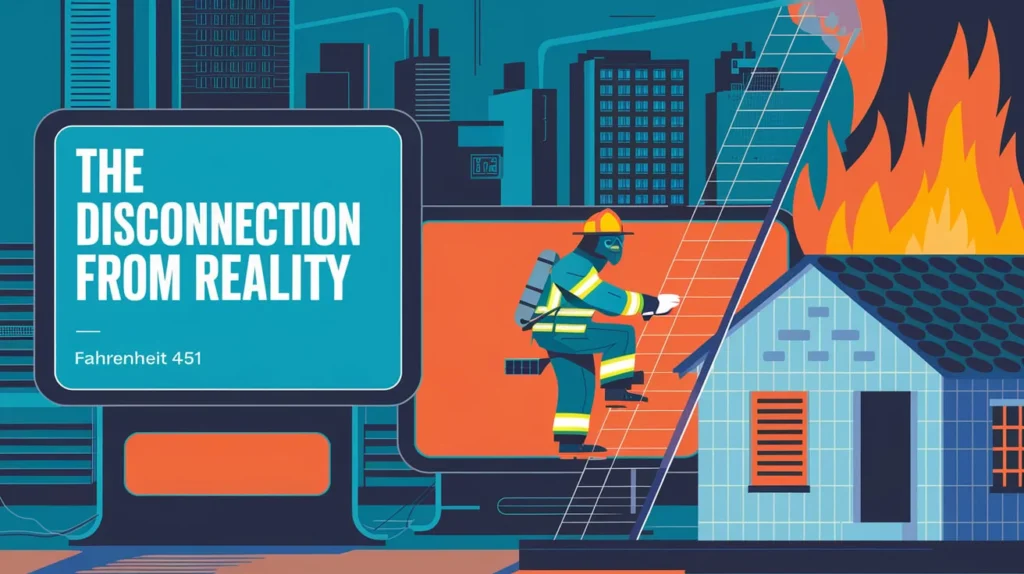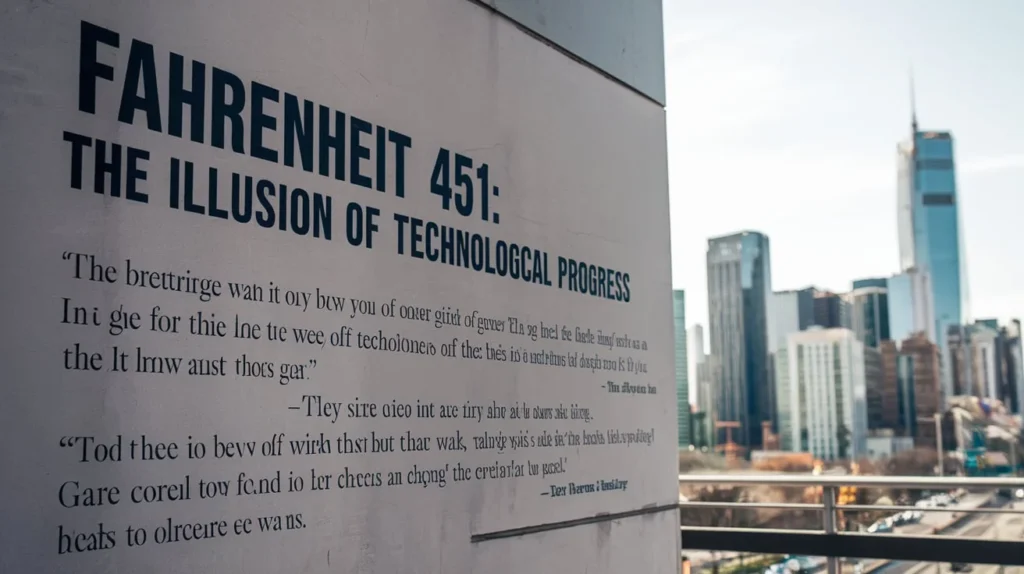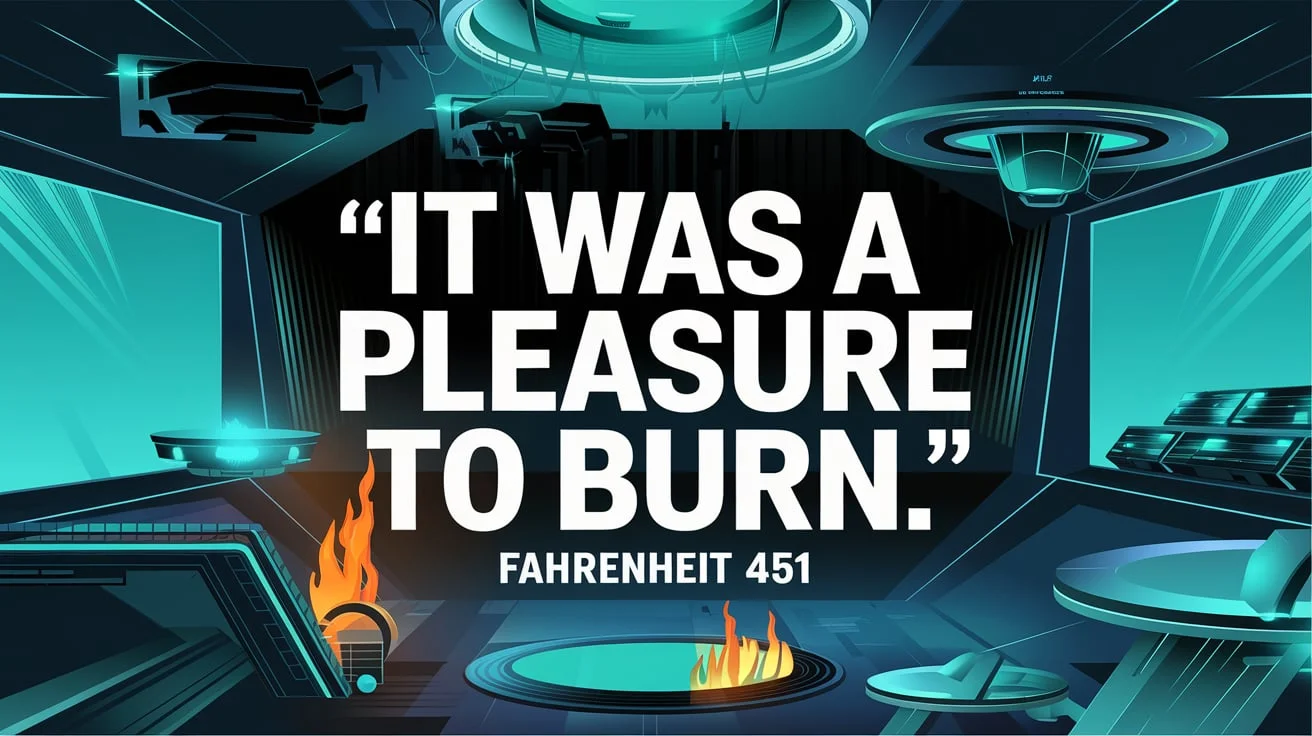Ray Bradbury’s Fahrenheit 451 is a profound exploration of the relationship between technology and society. In this dystopian world, technology plays a central role in shaping human behavior and controlling information.
This blog post delves into the impact of technology as portrayed in the novel, using quotes that reveal its significance and implications. Each section highlights how Bradbury’s vision of technology reflects our contemporary concerns and offers a critical analysis of its influence.
The Role of Technology in Society📺
- “The technology was designed to keep people distracted from the real issues of the world.”
- “Television screens in every home created a false reality, a world of illusions.”
- “In a society obsessed with technology, genuine human connections became rare.”
- “The constant noise of the screen drowned out any chance of deep thought.”
- “People were content to live in their technological bubbles, far removed from truth.”
- “The technology was a tool of control, designed to manipulate and pacify.”
- “Every electronic device served to reinforce the status quo rather than challenge it.”
- “Through technology, the government was able to monitor and suppress dissent.”
- “People’s lives were governed by the screens, leaving little room for personal reflection.”
- “The interference of technology disrupted the natural flow of communication.”
- “Technology was a means to disengage from the struggles and realities of life.”
- “The fascination with screens led to a decline in critical thinking.”
- “In Bradbury’s world, technology was both a blessing and a curse.”
- “The media provided a false sense of security, masking the underlying problems.”
- “Technology in the novel represents the alienation of individuals from their own existence.”
- “The over-reliance on screens made people forget the value of face-to-face interactions.”
- “Through the illusion of choice, technology maintained a tight grip on freedom.”
- “The technological advancements only served to fragment society further.”
- “Bradbury’s portrayal of technology reveals its power to shape perceptions.”
- “The dystopian use of technology highlights its potential for abuse and manipulation.”
Technology as a Tool of Oppression🖥️
- “The government used technology to enforce its will and silence critics.”
- “The censorship through technology ensured that only approved content was broadcast.”
- “In Fahrenheit 451, technology was a means of oppression rather than liberation.”
- “The lack of privacy in a world dominated by technology led to a loss of freedom.”
- “The surveillance technology was a constant reminder of the absence of personal space.”
- “By controlling the flow of information, technology became a weapon of the state.”
- “The oppressive regime used technology to manipulate and control the masses.”
- “Every technological advance served to enhance the regime’s power over individuals.”
- “Technology facilitated the spread of propaganda and stifled dissenting voices.”
- “In this world, technology was not an ally but an instrument of control.”
- “The constant monitoring by technology ensured that rebellion was almost impossible.”
- “Through technological dominance, the government ensured its perpetuation.”
- “The manipulation of media through technology kept the public in a state of ignorance.”
- “Technology was used to erase any trace of discontent or resistance.”
- “The mechanization of society led to a systematic suppression of individual thought.”
- “The oppression was masked by the facade of technological progress.”
- “Technology was leveraged to create a monolithic society where diverse opinions were suppressed.”
- “In the dystopian vision, technology was a tool to reinforce social hierarchies.”
- “The control exerted through technology highlighted its potential for abuse.”
- “The state’s control over technology ensured that freedom remained an illusion.”
The Disconnection from Reality📱

- “The overuse of technology led to a disconnection from the real world.”
- “People became ensnared by their devices, losing touch with reality.”
- “The screens provided a false sense of fulfillment, masking the emptiness within.”
- “Technology created a virtual existence, overshadowing the authentic experiences.”
- “The digital distractions kept people from engaging with their physical surroundings.”
- “In Bradbury’s vision, technology facilitated a disconnect from genuine human experiences.”
- “The obsession with screens led to a detachment from the natural world.”
- “Technology rendered real-life interactions as secondary to virtual connections.”
- “People were so immersed in their devices that they lost their sense of self.”
- “Virtual reality became a substitute for authentic human connections.”
- “Technology served as a barrier between individuals and their emotional lives.”
- “The constant engagement with screens created a numbness towards real emotions.”
- “In Fahrenheit 451, technology’s impact was to alienate individuals from true relationships.”
- “The digital realm overshadowed the importance of face-to-face interactions.”
- “Bradbury’s world showed how technology could lead to a diminishment of human intimacy.”
- “The disconnection from reality was exacerbated by the omnipresence of technology.”
- “Technology’s impact was to create a distance between people and their authentic selves.”
- “The illusion of connection through screens masked a profound loneliness.”
- “The virtual experiences offered by technology could not replace real-life moments.”
- “Bradbury’s depiction highlights how technology fosters a separation from true reality.”
Technology and Knowledge Suppression📚
- “In the novel, technology was used to suppress knowledge and curiosity.”
- “The firefighters represented the destruction of books and ideas through technology.”
- “Technology facilitated the eradication of critical thinking and independent thought.”
- “The burning of books was a means to control and limit intellectual growth.”
- “In Fahrenheit 451, technology was a tool to eradicate divergent ideas.”
- “The censorship of information ensured that only approved knowledge was available.”
- “Technology was employed to obliterate any challenging or subversive ideas.”
- “The manipulation of knowledge through technology stifled intellectual freedom.”
- “The destruction of books symbolized the repression of free thought.”
- “In this dystopian future, technology was a mechanism for controlling knowledge.”
- “The burning of literature was a technique to maintain ignorance.”
- “The obliteration of books through technology represented a threat to intellectual progress.”
- “Technology’s role was to neutralize any threats to the status quo.”
- “The control over information ensured that disruptive knowledge was eliminated.”
- “Technology was a means to prevent the spread of revolutionary ideas.”
- “The firefighters role in book burning highlighted technology’s role in suppressing knowledge.”
- “Technology’s impact was to restrict the availability of diverse perspectives.”
- “By controlling knowledge, technology ensured the perpetuation of a single narrative.”
- “The systematic destruction of books was a form of technological tyranny.”
- “Bradbury’s depiction of technology as a tool of suppression underscores its power to mold societies.”
The Illusion of Technological Progress🔍

- “In Bradbury’s world, technological progress was merely an illusion masking the regression of society.”
- “The advancements in technology were designed to distract from the real problems facing humanity.”
- “The seemingly endless innovations offered by technology were superficial and misleading.”
- “Technology created a facade of advancement, while underlying issues remained unaddressed.”
- “The shiny new devices represented a false sense of achievement in a declining world.”
- “Technological progress was used to create a false narrative of improvement.”
- “The optimism surrounding new technologies was a smoke screen for deeper social issues.”
- “Bradbury’s vision reveals how technological progress can sometimes mask societal decay.”
- “The apparent advancements in technology were designed to keep people complacent and uninformed.”
- “In this dystopia, technology provided a distorted view of progress and success.”
- “The illusion of progress was a tool to prevent people from questioning their reality.”
- “Technology’s rapid development often obscured the slow deterioration of societal values.”
- “The focus on technological innovation diverted attention from moral and ethical decline.”
- “The constant pursuit of technological achievements masked the loss of genuine progress.”
- “In Fahrenheit 451, the apparent success of technology was a deceptive cover for cultural collapse.”
- “The promise of technological progress was unfulfilled, leaving a world in disarray.”
- “Bradbury illustrates how technological advancements can sometimes lead to stagnation rather than growth.”
- “The technological facade in the novel created an illusion of betterment while hiding deterioration.”
- “The false allure of new technologies often masked the continuing decline of societal standards.”
- “The apparent progress driven by technology was in reality a distraction from true advancement.”
The Impact of Media Technology📺
- “Media technology in Fahrenheit 451 was used to manipulate and control public opinion.”
- “The constant bombardment of the media ensured that people were distracted from critical issues.”
- “The monopolization of media technology served to reinforce the regime’s control.”
- “Media technology created a homogenized view of the world, eliminating diverse perspectives.”
- “In the novel, the media was a tool to broadcast state-sanctioned messages and suppress dissent.”
- “The influence of media technology was pervasive, shaping every aspect of individual perception.”
- “Bradbury’s portrayal of media technology underscores its power to manipulate and influence society.”
- “The omnipresent screens broadcasted propaganda, reinforcing the regime’s ideology.”
- “The media served as a vehicle for the dissemination of controlled information.”
- “Media technology ensured that alternative viewpoints were silenced and ignored.”
- “The constant flow of media content kept people engaged but uninformed about reality.”
- “Media technology facilitated a monolithic view of the world, reducing intellectual diversity.”
- “Bradbury depicts how media technology can conform and limit public thought and awareness.”
- “The centralized media control created a uniform and monitored narrative for the public.”
- “Media technology was used to pacify and control the population, keeping them complacent.”
- “The technological tools of media were designed to reinforce the regime’s authority.”
- “In the dystopian world, media technology served to disrupt any effort towards critical thinking.”
- “Bradbury illustrates how media technology can be used to maintain political power.”
- “The dissemination of one-sided information through media technology was a form of control.”
- “The manipulation of media content ensured that the public remained uninformed and submissive.”
The Dangers of Technological Overreach🌐
- “In Fahrenheit 451, technological overreach led to a society devoid of authenticity.”
- “The expansion of technology into every aspect of life caused a loss of individual privacy.”
- “Bradbury warns against the unchecked growth of technology, which can lead to societal harm.”
- “The pervasive presence of technology resulted in the erosion of personal freedom.”
- “The intrusiveness of technology created a world where individuality was compromised.”
- “Technological overreach contributed to the totalitarian nature of the society in the novel.”
- “Bradbury illustrates how excessive technology can lead to a dehumanized and controlled existence.”
- “The dominance of technology led to a reduction in personal autonomy and freedom.”
- “In the novel, technological overreach facilitated a loss of genuine human experiences.”
- “The excessive reliance on technology resulted in a society where authenticity was sacrificed.”
- “Bradbury’s depiction shows how technological dominance can result in a dystopian reality.”
- “The overreliance on technology created a world where freedom was subjugated to control.”
- “The intrusiveness of technology highlighted the dangers of unchecked technological expansion.”
- “Technological overreach led to a conformist society where diversity was repressed.”
- “Bradbury’s world serves as a cautionary tale about the dangers of technological control.”
- “The omnipresence of technology contributed to the suppression of individual thought.”
- “In the novel, technology’s invasive nature serves to control and monitor every aspect of life.”
- “The excessive control by technology led to a society stripped of personal freedom and authenticity.”
- “Bradbury illustrates how technological overreach can lead to the compromise of human values.”
- “The dangers of unchecked technology are evident in the sacrifices made to maintain control.”
The Future of Technology and Society📖
- “Bradbury’s vision provides a warning about the future implications of technological dominance.”
- “The dystopian future depicted in the novel serves as a cautionary tale about technology’s impact.”
- “The novel questions whether the advancements in technology will lead to a better society or a dystopian future.”
- “Bradbury’s portrayal of the future warns of a world where technology might compromise humanity.”
- “The future of technology in Fahrenheit 451 serves as a reflection on current technological trends.”
- “The novel explores how future technological developments could lead to societal consequences.”
- “Bradbury’s work offers a vision of the future where technology could potentially control society.”
- “The dystopian future portrayed in the novel raises questions about the direction of technological progress.”
- “Bradbury’s depiction of the future serves as a critical analysis of technology’s role in shaping society.”
- “The future envisioned in Fahrenheit 451 highlights the risks of technological advancement unchecked by ethical considerations.”
- “The novel’s vision of the future provides a critical lens on the consequences of technological overreach.”
- “Bradbury’s portrayal of the future offers insight into how technology might influence societal norms.”
- “The depiction of future technology serves as a warning about potential losses of human values.”
- “Bradbury’s work suggests that the future of technology could result in a society where authenticity is compromised.”
- “The novel’s vision of the future serves as a reminder of the importance of ethical considerations in technological progress.”
- “Bradbury’s portrayal of future technology highlights the potential for abuse and misuse.”
- “The future in the novel serves as a critical reflection on current technological trends and their potential impacts.”
- “Bradbury’s work challenges us to consider the long-term effects of technological advancements on society.”
- “The novel provides a thought-provoking perspective on the future of technology and society’s evolution.”
- “Bradbury’s depiction of a technologically dominated future offers a critical analysis of potential societal changes.”
The Ethics of Technological Development🔬
- “Bradbury’s Fahrenheit 451 raises important ethical questions about the direction of technological development.”
- “The novel explores the moral implications of technological advancements on society.”
- “The ethical considerations of technology’s role in suppressing knowledge and freedom are central to the narrative.”
- “Bradbury’s work challenges readers to reflect on the ethical responsibilities of technological progress.”
- “The novel underscores the need for ethical frameworks in the development of new technologies.”
- “The ethical dilemmas posed by technology’s impact on society are explored in depth.”
- “Bradbury’s depiction of technology’s role in manipulating and controlling society raises moral questions.”
- “The dangers of technological development without ethical consideration are highlighted in the novel.”
- “Bradbury’s portrayal of technology serves as a warning about the ethical consequences of unrestricted advancements.”
- “The novel encourages a discussion on the ethical use of technology in shaping society’s future.”
- “The ethical impact of technology on personal freedom and privacy is a key theme in the narrative.”
- “Bradbury’s work serves as a cautionary tale about the moral implications of technological progress.”
- “The novel illustrates the need for responsible and ethical approaches to technological development.”
- “The ethical considerations surrounding technology’s influence on societal norms are critically examined.”
- “Bradbury’s vision calls for a re-evaluation of the ethical standards in the development and implementation of technology.”
- “The novel highlights how unethical technological practices can lead to a dystopian reality.”
- “Bradbury’s depiction of technology raises important moral questions about its role in societal control.”
- “The ethical challenges of technological advancements are central to understanding the novel’s themes.”
- “Bradbury’s work serves as a reminder of the need for ethical considerations in technological progress.”
- “The novel provides a critical perspective on the ethics of technology and its impact on human values.”
The Role of Technology in Human Disconnect🌟
- “In Fahrenheit 451, technology serves as a barrier between individuals and genuine human connections.”
- “Bradbury illustrates how technological advancements led to a widespread sense of isolation and disconnection.”
- “The overuse of technology resulted in a diminished ability to form meaningful relationships.”
- “In the novel, technology’s impact on personal interactions creates a society of disconnected individuals.”
- “The proliferation of technology led to a loss of authentic communication and emotional intimacy.”
- “Bradbury’s portrayal shows how technology can distract people from forming deep emotional bonds.”
- “The omnipresence of screens and media fostered a culture of superficial interactions and emotional detachment.”
- “The novel explores how technology facilitated a disconnect from genuine human experiences.”
- “In Fahrenheit 451, technology’s influence results in a society where individuals are emotionally isolated.”
- “The overreliance on technology contributed to a decline in face-to-face communication and emotional depth.”
- “Bradbury’s depiction of technology highlights its role in stripping away meaningful human connections.”
- “The constant engagement with technology created a barrier to authentic personal relationships.”
- “The novel portrays how technological saturation can lead to emotional numbness and social fragmentation.”
- “Bradbury warns of a future where technology might replace genuine human interactions with shallow exchanges.”
- “The disconnect fostered by technology in the novel emphasizes the dangers of over-dependence on digital communication.”
- “The isolation induced by technology reflects a wider trend of social fragmentation and emotional distance.”
- “In Fahrenheit 451, technology’s influence on human relationships underscores a growing sense of alienation.”
- “The novel presents a cautionary tale about the risks of technology-induced isolation and emotional detachment.”
- “Bradbury’s world illustrates how technological dependency can erode authentic connections and emotional engagement.”
- “The emotional disconnect caused by technology serves as a central theme in Bradbury’s critique of modern society.”

Haroon is a passionate wordsmith with a deep love for the art of quotes. With a keen understanding of how a few well-chosen words can make a profound impact, has dedicated his career to curating and sharing quotes that resonate with the soul. From timeless wisdom to modern reflections, He finds joy in exploring the power of language to inspire, heal, and empower.












